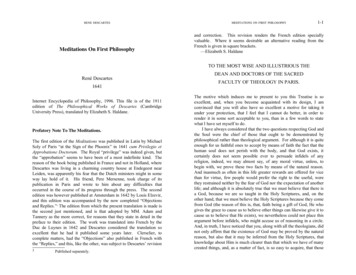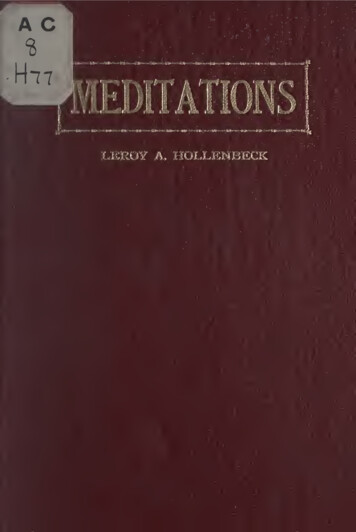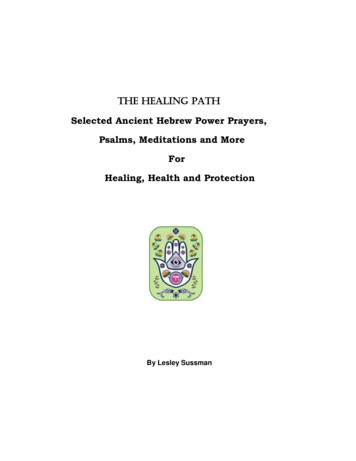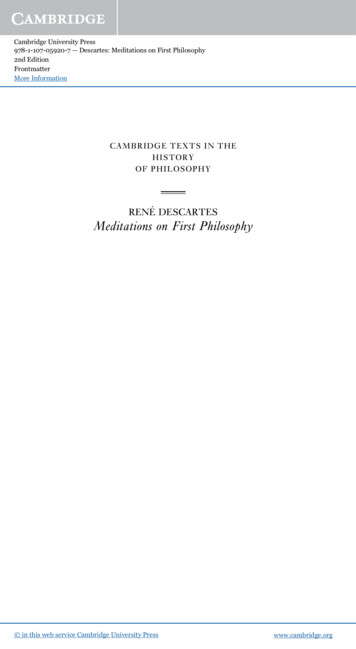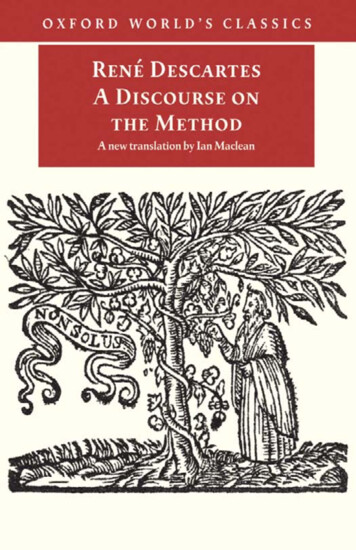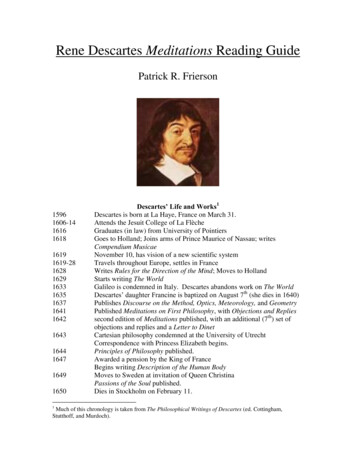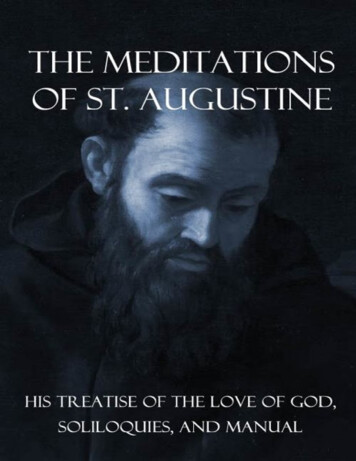
Transcription
THEMEDITATIONSofST. AUGUSTINE,(354-430)HISTREATISE OF THE LOVE OF GOD, SOLILOQUIES,AND MANUAL.TRANSLATED BYGEO. STANHOPE, D.D.Dean of Canterbury and Chaplain in Ordinary to her Majesty.LONDON:PRINTED FOR J. NUNN , RODWELL AND MARTIN , J. WALTER ,J.M . RICHARDSON , W . BAYNES, R . PRIESTLEY, R . FENNER ,T. BLANSHARD , OGLES AND CO , ALLMANS, AND J. CONDER1818.Source: oogMissing text (pp. 156-157) supplied from Pious Breathings.Lightly modernized, corrected, formatted, and annotated byWilliam H. Gross www.onthewing.org May 8, 2015
Editor’s PrefaceAugustine (354-430) was often quoted by later reformers and Puritans,who pointed out that the doctrines of grace they asserted — salvation bygrace alone, through faith alone, in Christ alone, standing on theauthority of Scripture alone, to God’s glory alone — were not new.Augustine, as you’ll see in his Meditations, reveals these same principles.He laid a foundation for the Reformation, a millennia later, whichenabled the Church to return to its scriptural roots — these roots.Augustine’s best-known works are his Confessions (c. 400), and The Cityof God (c. 413–426). I think this deserves to be named with them. It is hisdevotional. It is a passionate and clear celebration of God’s Plan ofSalvation, and of the Trinitarian God. It emphasizes our disabledcondition in a way that will be surprisingly familiar to any reformedChristian. If you’ve read Spurgeon’s devotional, Morning and Evening,you may find the styles very similar.Being a collection, it’s hard to say when Augustine wrote thesemeditations; but certainly some of it was done towards the end of his life.This edition of Meditations was translated from the Latin by GeorgeStanhope in 1701, and printed in 1818. Latin is not the easiest oflanguages to translate. To convey its poetry, takes a skilled linguist and agifted writer. Stanhope has taken Augustine’s personal meditations, andconverted them into a form that transports the reader into the heavenlies.Rarely is a private conversation with God recorded in such a way that thereader may join in that worship. I believe Stanhope succeeded in doingthat, by preserving for us the splendor of Augustine’s words andspeculations.George Stanhope (1660-1728) was Dean of Canterbury and a RoyalChaplain. He was a leading figure in church politics in the early 18thcentury. He was one of the great preachers of his time, and preachedbefore Queen Anne in St Paul's Cathedral in 1706 and 1710. The challengein modernizing Stanhope’s language of three hundred years ago, was toretain, as he retained, the substance of Augustine’s work, while remainingfaithful to its poetic character.Wherever possible, I preserved his wording, along with the rhythm of hisprose, even as I updated the vocabulary and syntax. Whether I succeededor not, is for the reader to judge. What may seem to be run-on sentences,
punctuated by semi-colons, colons, and dashes, might have been betterformatted into stanzas; but that’s not how Stanhope formatted it for hispublisher. He italicized verses to distinguish them from Augustine’swords, and added verse references. I included additional verse references.I also italicized as needed to aid readability. Some of the sentences werevery long; the punctuation lets the reader take a breath as he reads.Now, I can’t say if Stanhope substituted the wording of the King James,Douay-Rheims, or Geneva bibles for Augustine’s (e.g. “farthing” on p.271), or if Augustine’s wording was itself taken from Jerome’s Vulgate c.405. But I don’t think it matters: its inherent truth and beauty are of God,not man. I pray that this little book affords you, as it did me, many joyoushours of introspection, meditation, and worship.William H. GrossMay 25, 2019
DedicationTO HERROYAL HIGHNESSTHEPRINCESS ANNE OF DENMARK.1May it please your Royal Highness,THE following Devotions, in their original language, abundantlyrecommend themselves to the world, not only by their own intrinsicworth, but by the authority of those venerable names among whose worksthey are published. And since this last advantage is what the Englishcannot receive from the character of the translator, your Royal Highnesswill, I hope, have the goodness to pardon his ambition in presuming tosupply that defect, by the honour of your Royal Highness’s patronage andacceptance. That holy zeal, which they are intended to kindle in others,good men behold with great satisfaction already shining bright in yourRoyal Highness; so that their proper and utmost efficacy to be attainedwith regard to you, Madam, is the cherishing and exercising of thatdevotion and piety with which, I pray God, they may in some degree beserviceable for inspiring common readers.iv DEDICATION.May the Fountain of all goodness preserve your precious life, andcontinue your Royal Highness long to us, a bright example and a signalblessing to this and future ages! May he hear and grant the daily petitionsof his church, endue you with his Holy Spirit, enrich you with hisheavenly grace, prosper you with all happiness, and bring you to hiseverlasting kingdom! These, Madam, I beg leave, with all humility andmost profound respect, to assure your Royal Highness, are the sincere,earnest, and constant prayers of,May it please your Royal Highness,Your Royal Highness’sMost obedient, andMost devoted Servant,GEO. STANHOPE.April 12, 1701
ContentsEditor’s PrefaceDedicationBook I. AUGUSTINE’S MEDITATIONSCHAP. 1. A Prayer for Reformation of Life.CHAP. 2. An Act of Self-accusation, and imploring the Divine Mercy.CHAP. 3. The Sinner’s Lamentation for his Prayers not being heard.CHAP. 4. An Act of Fear.CHAP. 5. An Address to the Father in the Son’s Name.CHAP. 6. The Son’s Sufferings represented to the Father.CHAP. 7. An Acknowledgment that sinful Man was the Cause ofChrist’s Sufferings.CHAP. 8. The Soul’s Application of Christ’s Death and Sufferings toherself by Faith.CHAP. 9. A Prayer to the Holy Ghost.CHAP. 10. An Act of Humility.CHAP. 11. A Prayer to the Holy Trinity.CHAP. 12. A Confession of God’s Omnipotence and Majesty.CHAP. 13. Of the Incarnation of the Divine Word.CHAP. 14. An Act of Trust in, and Thanksgiving for, Christ and hisSufferings.CHAP. 15. Of God the Father’s Love to Mankind.CHAP. 16. Of the Two Natures in Christ.CHAP. 17. Of the Thanks due to God for the Redemption of the World,CHAP. 18. A Devout Prayer to Christ.CHAP. 19. The Souls of the Righteous are the House of God.CHAP. 20. The Pious Soul’s longing for Heaven.CHAP. 21. The Miseries of the Present Life.CHAP. 22. The Happiness of that Life prepared for those who love God.CHAP. 23. The Happiness of holy Soul’s at their Departure out of thisWorld.
CHAP. 24. A Prayer for Succour in Trouble and Danger.CHAP. 25. The pious Soul’s Desire of Heaven.CHAP. 26. An Act of Praise.CHAP. 27. How God may be seen, and possessed by Man.CHAP. 28. How God may be Praised.CHAP. 29. Of the Plurality of Persons in the Unity of the DivineEssence.CHAP. 30. A Prayer to the ever-blessed Trinity.CHAP. 31. God the True Life.CHAP. 32. The Praises of Angels and Men.CHAP. 33. A Prayer for Zeal in the Service and Praise of God.CHAP. 34. An Act of Devotion and Love of God.CHAP. 35. A Devout Prayer to Christ.CHAP. 36. Another Prayer to the same Purpose.CHAP. 37. A Prayer in Time of Affliction.CHAP. 38. A devout Prayer for Pardon of Sins.CHAP. 39. A Useful Prayer.CHAP. 40. Devout Reflections upon the Sufferings of Christ.Book II. OF THE LOVE OF GOD.CHAP. 1. Narrow the Way that Leads to Life.CHAP. 2. Upon what accounts, and in what manner, we ought to loveGod.CHAP. 3. How God made all Things for Man.CHAP. 4. Of the Love of God towards us.CHAP. 5. Of the Fruition of God.CHAP. 6. The Mercies of Creation and Regeneration.CHAP. 7. The Mercy of being called to the true Faith.CHAP. 8. Of the Communications of Divine Grace.CHAP. 9. The Mercy of Instruction and Illumination.CHAP. 10. God’s tender Care and constant Presence with us.CHAP. 11. The Benefit of our bodily Senses, and the preservation of our
Lives.CHAP. 12. God’s long-suffering and Mercy which preserved us from,and forgave us after, the commission of sin.CHAP. 13. The Power of Mastering Temptations.CHAP. 14. The Benefit of a Holy Hope.CHAP. 15. The many Instances of God’s Bounty, notwithstanding ourSins, and the Thanks due to him on this Account.CHAP. 16. Of the Death of Christ.CHAP. 17. The Promises of God.CHAP. 18. The Happiness of a Future StateBook III. Select Meditations out of AUGUSTINE’S SOLILOQUIES.CHAP. 1.CHAP. 2.CHAP. 3. The Misery of Unregenerate Man.CHAP. 4. An Act of Praise for God’s Manifold Mercies in Man’s PresentState.CHAP. 5. The Excellency of Man’s Future State.CHAP. 6. Of the Almighty Power of God.CHAP. 7. A Prayer for the Divine Grace and Protection.CHAP. 8. A Prayer against Evil Desires.CHAP. 9. Of God’s seeing all the Actions and Intentions of Men.CHAP. 10. The Impotence of Human Nature to resist Temptations,without the Assistance of Divine Grace.CHAP. 11. The manifold Goodness of God, and what Improvement weshould make of it.CHAP. 12. The Consideration of the Divine Goodness: our hope andcomfort in Sufferings.CHAP. 13. The Methods of God’s Grace in our Sanctification andSalvation.CHAP. 14. We are not to conceive God to be a sensible Object.CHAP. 15. A Confession of our Vileness and God’s Excellences.CHAP. 16. The Soul’s earnest Longings after Future Happiness.
CHAP. 17. A Concluding Prayer to the Holy Trinity.Book IV. AUGUSTINE’S MANUALThe Preface.CHAP. 1. The Excellences of the Divine Essence.CHAP. 2. The inexpressible Perfection of the Divine Knowledge.CHAP. 3. The Thirst of the Soul after God.CHAP. 4. The Misery of those who do not seek and love God,CHAP. 5. Prayer for Grace to love God above all Things.CHAP. 6. The Happiness of Souls delivered from their earthly Prisons.CHAP. 7. Of the Comforts afforded good Men under their presentTrouble.CHAP. 8. An Act of Love and Devotion.CHAP. 9. The Pleasure of Meditating upon God.CHAP. 10. Of loving God, and the Advantages of doing so.CHAP. 11. The good Effects of meditating on Christ’s Death andSufferings.CHAP. 12. Of the Knowledge of the Truth.CHAP. 13. The Marks and Fruits of true Love.CHAP. 14. The exquisite Goodness of God.CHAP. 15. The Happiness of the Saints hereafter.
Book I.AUGUSTINE’S MEDITATIONSCHAP. 1.A Prayer for Reformation of Life.INSPIRE my soul, O Lord my God, with a holy desire of you, my chief, myonly good, that I may so earnestly desire as diligently to seek you, sosuccessfully seek as to be happy in finding you; make me so sensible ofthat happiness in finding, as most passionately to love you; so effectuallyto express that love, as to make some amends for my past wickedness, byhating and forsaking my former evil courses, and entering upon a2conversation exemplarily pious for the time to come.Give me, dear God, hearty repentance, a humble and contrite spirit; makemy eyes a fountain of tears, and my hands liberal dispensers of alms, andunwearied instruments of good works. You are my King; reign absolute inmy heart, subdue and expel from there all rebellious passions; quench allthe impure burnings of fleshly lusts, and kindle in it the bright fire of yourlove.You are my Redeemer, beat down and drive out the spirit of pride, and3impart to me, in much mercy, the treasure of your own unexampledhumility and wonderful condescension.10You are my Saviour, take from me the rage of anger; and arm me, Ibeseech you, with the shield of patience.You are my Creator, root out from me all that rancour and malicewhereby my nature is corrupted; and implant in me all that sweetnessand gentleness of temper, which may render me a man made in your ownimage, and after the likeness of your own Divine goodness.You are my most merciful and indulgent Father, O grant your own childthose best of gifts: a firm and right faith, a steadfast and well-groundedhope, and a never-failing charity.O my director and governor, turn away from me, I beseech you, vanityand filthiness of mind, a wandering heart, a scurrilous tongue, a proudlook, a gluttonous belly; preserve me from the venom of slander anddetraction, from the itch of curiosity, from the thirst of covetousness,
ambition and vain-glory; from the deceits of hypocrisy, the secret poisonof flattery; from contempt of the poor, and oppression of the helpless;from the canker of envy, the fever of avarice, and the pestilential diseaseof blasphemy and profaneness.Prune away my superfluity of naughtiness, and purge me from all mannerof injustice, rashness, and obstinacy; from impatience, blindness of heart,and cruelty of disposition.Incline me to obey that which is good, and to comply with wholesomeadvice; enable me to bridle my tongue, and to contain my hands fromwrong and robbery. Suffer me not to insult the poor, to defame theinnocent, to despise my inferiors, to treat my servants with severity andscorn, to fail in due affection towards my friends and relations, or inkindness and compassion towards my neighbours and acquaintances.11O my God, you fountain of mercy, I beg you, for the sake of the Son ofyour love, dispose me to the love and practice of kindness and mercy; thatI may have a tender fellow-feeling of my brethren’s afflictions; and applymyself cheerfully to rectify their mistakes, to relieve their miseries, tosupply their wants, to comfort their sorrows; to assist the oppressed, toright the injured, to sustain the needy, to cherish the dejected, to releasethose who are indebted to me, to pardon those who have offended me, tolove those who hate me; to render good for evil, to despise none, but payall due respect to every man. Give me grace to imitate those who live well,to avoid and beware of those who do ill; to follow all manner of virtue,and utterly abandon and detect all sorts of vice — make me patient inadversity, and moderate in prosperity. Set a watch before my mouth, andkeep the door of my lips (Psa 141.3). Wean my affections from thingsbelow, and let them be eager and fixed upon heaven and heavenly things.CHAP. 2.An Act of Self-accusation, and imploring the Divine Mercy.YOU, Lord, who have formed me, know the work of your own hands; andyet, because I am your creature, I have been bold to ask many and greatmercies — though these are less than, and altogether unworthy of theleast of all your mercies (Gen 32.10). I acknowledge, O my God, withshame and sorrow, that not only the gifts and graces I have beenimploring all this while, are in no degree my due; but that many andgrievous sufferings and judgments are what I have justly deserved at your
hands. But when my soul feels itself sinking under the weight of thismelancholy reflection, the publicans, and harlots, and sinners, (Mat21.31), those wandering and lost sheep which the good Shepherd soughtso carefully (Luk 15.4),12drew back from the very bribe of the hellish precipice so seasonably,brought home upon his shoulders so joyfully, and laid in his bosom soaffectionately — these raise my drooping spirits, and give new life to myhopes. For you, my God, you have made all things by your power, and arewonderful in all your doings; yet you are most wonderful, and exceedingglorious in your works of pity and love. In this sense, too, is that mosttrue, which you speak of yourself by the mouth of your servants. The Lordis good to all, and his tender mercies are over all his works (Psa 145.9).And what was said of one particular person, we may most truly apply toyour people in general, my mercy I will not take from him (Psa 89.24,28). For you abhor, despise, forsake no man; but only those who, lost toall sense of their own duty and happiness, first despise and forsake you.Hence it is, that not only do you not strike when you are angry, but evenwhen you are most justly so, you give good things liberally, upon therequest of those wretches who have provoked you to anger. O my God,the horn of my salvation, and my refuge, I am sadly sensible that I amone of those miserable wretches; I have provoked your wrath, and doneevil in your sight; and yet you stay your hand. I have sinned, you havesuffered: I have offended, and still you bear with me. If I repent, youspare; if I return, you receive me with open arms; indeed, even while Idelay, you wait patiently for my coming back to you. You call me to youwhen I go astray; you invite me while I am deaf to your gracious calls; youstay till I shake off my wicked sloth; and when your prodigal child at lastreturns, you meet and embrace him most gladly. You instruct myignorance, comfort my sorrows, keep me from falling, raise me up when Iam fallen, give when I ask, are found when I seek you, and open the doorwhen I knock (Mat 7.7).13Thus, O God of my salvation, I have nothing to offer in my own excuse;no plea to make when you charge me with folly. There is no refuge for me,but in your goodness and protection; no place to hide me in from yourall-seeing eye. You have shown me the right way; you have taught me how
I ought to walk in it; you have threatened the torments of hell to frightenme from wickedness; and promised the joys of heaven to encourage myobedience.And now, O Father of mercies, and God of all comfort, perfect, I beseechyou, these gracious designs upon your servant; possess me thoroughlywith your fear, that I may not dare to incur your threatenings; andsupport me with the joy of your salvation, that I may be filled with yourlove, and cheerfully run the race that leads to your gracious promises.You, O Lord, are my strength, my God, my refuge and only deliverer: O bepleased to inspire my soul with proper thoughts of you; teach my tonguefit words to call upon you acceptably; and enable my hands, and everymember, to do the thing that pleases you. I know full well that there isone way of pacifying your wrath, one offering which your mercy will notreject. The sacrifices of God are a troubled spirit — a broken and acontrite heart my God will not despise (Psa 51.17).Yet even this I cannot give my God, unless he first grants to give it me.And therefore, O Father of lights, from whom every good thing comes,enrich me, I beseech you, with this, I ask no other treasure; let this be myintroduction into your presence, this my defence against the assaults ofspiritual enemies; this my fountain of tears to quench the flames of sin;this my sure retreat from the fury of inordinate passions and desires.14Suffer me not, O you strength of my soul’s health, suffer me not, I beg, tobe one of those “weak Christians, who for a time believe, and in time oftemptation fall away (Luk 8.13). But cover my head in the day of battle;for you, you only are my hope in the day of trouble, and my safety in thetime of danger (Psa 140.7; 27.1).Thus I come to you, my light and my salvation, imploring the blessingsof which I stand in need, and declaring the miseries of which I am afraid.But in the midst of this address, I feel a check from within; my consciencestings, and my heart misgives me; love bids me hope, but sense of sinbids me fear; and dread of your displeasure dampens that zeal with whichmy heart approaches you: when I reflect on my own doings, I cannot butdespond; when I look up to your goodness, I am full of hope. Thekindness of my God invites and pushes me forward, the wickedness of myown heart dismays and pulls me back. And all my faults appear in suchghastly shapes before my eyes, as almost hinder a holy confidence, but
quite beat down the boldness of presumption.CHAP. 3.The Sinner’s Lamentation for his Prayers not being heard.THUS is my soul distracted with different passions, when I appear beforethe Divine Majesty. And how, alas! should it be otherwise? For with whatface can that man entreat a favour, who has deserved nothing but hatredand indignation? What rashness is it to ask glory, when only punishmentis his due?15The malefactor provokes his judge, and instead of satisfying for hisoffence, he expects to be honoured with crowns and rewards: he liesunder sentence of condemnation, and is it not insolent to sue for a bountyto which he has no manner of pretence? A stupid child provokes a mostaffectionate father, and is it not a yet greater provocation to assume forhimself the claim of inheriting, till he has first retracted his undutifulbehaviour? This, O my Father, I confess with grief to be my own case: Iask life, and have deserved death; I have been disloyal to my King, andyet have the confidence to fly to him for protection; I have despised myJudge, and armed his angry justice against my guilty self; and yet thissame Judge I betake myself to for succour. I have stopped my ears againstthe commands of a father, and yet I take it upon myself to depend on himfor his paternal affection and care.To you, I come; but, oh! how long do I take before I come? How muchprecious time do I trifle away in this most important, most necessaryaffair? My feet, alas! are swift to ruin, but slow in the way that leads to lifeand safety. I run after sickness, and wounds, and death, and take no careto shun the darts which made those wounds, even when I have felt thesmart, and am healed of the sore. I did not prevent those dangers whichmight have been avoided, and I am at last awakened into a sense of them,when they have brought me to the very gates of the grave. I have added tomy plagues by multiplying my transgressions, and torn open my oldwounds by relapsing into my former evil courses; and those maladieswhich the spiritual physician had cured, the frantic patient has againbrought upon himself: the sore which was skinned over, now breaks outafresh, because it was inflamed by that repeated folly which has forfeitedthe mercy extended before.16
I know who has declared that when the righteous man turns away fromhis righteousness, and commits iniquity, all the righteousness that hehas done shall not be mentioned (Eze 18.24). And if this righteous man,when he falls into sin, loses all the benefit of his former righteousness,what good can be expected for the ineffectual remorse of that sinner whocommits evil, and repents of it, and then does the same evil again? To me,this is a mortifying thought— to me, who have so often returned with thedog to the vomit, and with the sow that was washed, to her wallowingin the mire (2Pet 2. 22).How oft I have offended, it is not in my power to remember. But this Iown with a heavy heart: that, in general, I have taught men how to sin,and made those wise and skilful in wickedness, who before lived in happyignorance of it. I have persuaded those who were averse, forced thosewho resisted me, and readily complied and taken part with those whoseinclinations were to do amiss. I have laid snares for those who walkedsecurely; betrayed those into the pit, who desired to be informed in theright way; and that I might dare to be guilty of those things, I have daredto forget and drive out of my mind those good principles and greatobligations of gratitude to so good a God, which should have restrainedme from them.But however faulty my own memory may be, yet I have to deal with a justand terrible Judge: one who seals up my iniquities in a bag, and spiesout all my ways. And though you have held your peace, and have beenstill, and refrained a long time, yet I dread to think the day will come,when you will cry like a travailing woman, and destroy and devour theungodly at once (Job 14.17. Psa 139.2. Isa 42.14).17CHAP. 4.An Act of Fear.THE Lord, even the most mighty God, shall come, I know you shallappear, and not always keep silence (Psa 50.1, 2, 4). Then shall yourglory be seen, then shall your voice be heard, then your terrors felt by allthe world; when a fire shall devour before you, and a horrible tempestbe stirred up round about you. When you shall call to the heavens fromabove, and to the earth, that you may judge your people. And must oursins, which we now so industriously conceal, must every aggravatingcircumstance then be laid open before so many thousand millions of
witnesses? Must I then be upbraided before so many troops of angels andsaints, with not only my evil deeds, but even with the sins of word andthought? Must I then stand helpless and friendless before so manyjudges? Must I be confounded with the reproaches of so many eminentpatterns of piety and virtue, whose examples I refused to follow? Must Istand the shock of so many witnesses, who will testify against me howoften their charitable advice has been given to me, to no purpose, andhow ineffectual was all the good they did to provoke my imitation!Blessed God! What shall I have to say, or how shall I find an evasion? Thevery apprehension racks me at this distance; my conscience flies in myface; and I have this dismal prospect continually in view. I see, and dailylament my danger, and every vicious disposition helps to dress up thewoeful scheme. My secret imaginations sting me, my covetousness fettersme, pride accuses, envy gnaws and consumes me, lust inflames,intemperance shames me; detraction tortures, ambition supplants,violence and fraud upbraid; anger disorders, gentleness makes me secure,sloth overcomes, hypocrisy cheats me, flattery makes me effeminate,applause and favour vain, slander full of anguish.18These, my great, my only deliverer, these are the fierce nations that makewar against me: these the acquaintances I have been brought up with;this the company I have delighted to frequent, and contracted the mostaccurate familiarity with. Thus the objects of my love condemn me, andto my shame and dishonour. These are the friends I have trusted, theteachers I have learned from, the masters, or rather the tyrants, I havelived in subjection to; the counsellors I have been governed by, thecompanions I have lived and acted with.Woe is me, my God, that I have thus long dwelt in Meshech, and had my4habitation among the tents of Kedar. (Psa 120.5, 6). For sure, whateverreason David had, I have much greater to lament, that my soul has longdwelt among those who are enemies to peace. But you, O Lord, are stillmy hope and stay. In your sight, it is true, no flesh living shall bejustified (Psa 143.2). I therefore do not put any trust in the sons of men:for if you, Lord, should be extreme to mark what is done amiss, whoamong them is there, who might abide it? (Psa 130.3). And therefore,unless you prevent the sinner with your mercy and pardon, for what hasbeen done amiss, there cannot be any righteous to be glorified, any
qualified for a reward of what has been done well.Therefore, my God and my salvation, I believe in you, knowing that yourgoodness leads to repentance. How sweet are those words of yours tomy throat! Yes, sweeter than honey to my mouth, that no man comes toyou unless the Father draws him, and that the one who comes to you,you will by no means cast out (Rom 2.4; Psa 119.103; Joh 6.37, 44).19Since, then, you have not only instructed me in, but even given me newlife by the knowledge of this truth, and thus again made me your owncreature, I do with all imaginable earnestness, with all the sincerity andzeal my heart is capable of, beseech you, Almighty Father, together withyour most dearly beloved Son, and you, O best beloved Son, with yourmost sweet Comforter, draw me, that I may run after you, and bedelighted with the aroma of your precious ointments, (Song 1.3, 4).CHAP. 5.An Address to the Father in the Son’s Name.I CALL upon you, my God, indeed, even upon you I call, who declareyourself near to all those who call upon you in truth (Psa 145.18). Yes,you yourself are truth, and therefore teach me, for your mercy’s sake, toperform this service as I should; for without you I do not know how toplease you; and therefore I make it my most humble and earnest requestto be taught by truth itself. All wisdom without you is no better than folly;and to know you alone, is the sum and perfection of knowledge. Informme, therefore, O Divine wisdom, and make me understand your statutes.For I am fully persuaded that he, and he alone, is blessed whom younurture and teach in your law (Psa 94.12).My desire is to call upon you, and to do it in truth: but what can callingupon truth itself in truth mean, except applying to the Father by the Son?Therefore, holy Father, your word is truth; and the beginning of yourword in the gospel has told us that, in the beginning was the word, (Joh1.1). In that word of truth I call upon you, O essential and original Truth,and beg to be directed in, and thoroughly taught, the truth.20And what can be more delightful, than to address Him who begot, in thename of his only begotten? than to move the Father to tenderness, by themention of his own dear Son? than to appease the wrath of a king, by
interposing the darling of the family, the heir of all his dominions? Theseare the powerful methods used by malefactors for release out of prison;by slaves and captives for obtaining freedom; by condemned persons forpardon; indeed, powerful enough to prevail, not only for pardon, but evenfor favour and advancement too. A king’s anger cools instantly if theoffenders are such favourites of the prince, as to make use of his nameand interest: and servants find it no hard matter to come off withoutblows, if the children employ their pretty endearments in their behalf.Since, then, these methods are so successful below, why should they nothave the same good effect above? I will beg the almighty Father for thesake of his almighty Son, to bring my soul out of prison, that I may givethanks to his name (Psa 142.7). Loose me, Lord, from the bands of mysins, for the sake of your only, your co-eternal Son; and by theintercession of that dear, that Divine image and brightness of your glory,now sitting at your right hand, be reconciled to a poor sinful wretch; andinstead of that death with which my wickedness deservedly threatens me,raise and restore me to a life of hope and blessedness.This is indeed the only advocate I can employ: for where would I flee, orwhose interest would
Book I. AUGUSTINE’S MEDITATIONS CHAP. 1. A Prayer for Reformation of Life. CHAP. 2. An Act of Self-accusation, and imploring the Divine Mercy. CHAP. 3. The Sinner’s Lamentation for his Prayers not being heard. CHAP. 4. An Act of Fear. CHAP. 5. An Address to the Father in the Son’s N


